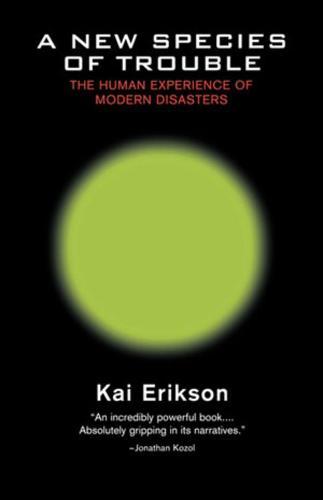Overview
Unlike earthquakes and other natural catastrophes, this """"new species of trouble"""" afflicts persons and groups in particularly disruptive ways. With clear-eyed compassion, in vivid narrative and in participants' own words, Kai Erikson describes how certain communities have faced such disasters. He shows conclusively that new attention must be paid to their experiences if people are to maintain elementary confidence not only in themselves but in society, government, and even life itself.
Full Product Details
Author: Kai Erikson
Publisher: WW Norton & Co
Imprint: WW Norton & Co
Edition: New edition
Dimensions:
Width: 14.00cm
, Height: 2.00cm
, Length: 21.10cm
Weight: 0.341kg
ISBN: 9780393313192
ISBN 10: 0393313190
Pages: 264
Publication Date: 11 October 1995
Audience:
College/higher education
,
Professional and scholarly
,
Undergraduate
,
Postgraduate, Research & Scholarly
Format: Paperback
Publisher's Status: Active
Availability: Out of print, replaced by POD

We will order this item for you from a manufatured on demand supplier.
Reviews
Vividly illustrates how administrative power and market forces, when they come loose from any communicative relation with the people they affect, can have devastating consequences, destroying the trust without which people cannot live resilient lives. -- Robert N. Bellah, Yale University
Incredibly powerful. . . . A little gem of a book, absolutely gripping in its narratives. -- Jonathan Kozol The very best kind of social writing-a strong, morally awake, clear-headed effort to understand what has happened, again and again, in our twentieth-century American life-a narration of tragedies of our own making. -- Robert Coles Vividly illustrates how administrative power and market forces, when they come loose from any communicative relation with the people they affect, can have devastating consequences, destroying the trust without which people cannot live resilient lives. -- Robert N. Bellah, Yale University
The very best kind of social writing a strong, morally awake, clear-headed effort to understand what has happened, again and again, in our twentieth-century American life a narration of tragedies of our own making.--Robert Coles
""Incredibly powerful. . . . A little gem of a book, absolutely gripping in its narratives."" -- Jonathan Kozol ""The very best kind of social writing—a strong, morally awake, clear-headed effort to understand what has happened, again and again, in our twentieth-century American life—a narration of tragedies of our own making."" -- Robert Coles ""Vividly illustrates how administrative power and market forces, when they come loose from any communicative relation with the people they affect, can have devastating consequences, destroying the trust without which people cannot live resilient lives. "" -- Robert N. Bellah, Yale University
Erikson (Sociology/Yale) expands his earlier examination of communities under stress (Everything in Its Path, 1977) in an attempt to define a new kind of trauma that those victimized by man-made disasters now face. According to Erikson, what happens after a disaster such as a dam break or an oil spill is often at least as traumatic as the primary event itself. He highlights the plight of the Grassy Knoll Indians in Ontario, who faced both relocation by the Canadian government and the discovery that mercury was contaminating their river; the mercury poisoned their bodies, and being uprooted from their ancestral lands shattered their culture. Erickson examines a Ft. Collins, Colorado, suburb threatened by an underground gas leak caused by a Royal Petroleum service station; he then revisits the nuclear disaster at Three-Mile Island and the potential consequences of a proposed nuclear waste-disposal site in California's Yucca Mountains. Among other cases he discusses are the homeless, the victims of Hiroshima, and the subject of his original book, the victims of the Buffalo Creek Flood. In all these instances, Erikson is heading toward a distinction between natural and unnatural disasters, arguing that while natural disasters (e.g., earthquakes and hurricanes) can sometimes build a sense of community, unnatural disasters usually destroy it along with any collective feeling of trust and security. These points have been previously made by sociologists Michael Edelstein and Phil Brown. Unfortunately, Erikson, who often testifies in litigation cases involving trauma, leaves the reader frustrated and ultimately dissatisfied by his failure to bring up to date his report and conclusions on the communities examined. (Kirkus Reviews)
Vividly illustrates how administrative power and market forces, when they come loose from any communicative relation with the people they affect, can have devastating consequences, destroying the trust without which people cannot live resilient lives. --Robert N. Bellah, Yale University




